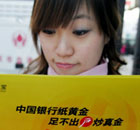Opinion
What's next for China's monetary policy?
(China Daily)
Updated: 2010-02-03 08:04
 |
Large Medium Small |
SHANGHAI/BEIJING: China has begun moving at the margins to withdraw excess cash from the financial system, as a spike in lending in the first few weeks of the year prompted concerns that credit growth was getting out of hand.
The moves, which have included increasing banks' required reserves as well as additional punitive reserve requirements for some lenders, have prompted jitters in global markets as investors worry that tightening in the world's third-largest economy could drag down growth both in China and elsewhere.
Following are some possible next steps the government will take, together with their likely ramifications:
Gradual ramping up of tightening measures
Most likely.
Many analysts expect the People's Bank of China to follow up on its recent steps by continuing gradually to push up money market rates, to drain cash from the financial system through its open-market operations, and to carry out so-called window guidance to tell banks to pace their lending.
Most do not expect any more aggressive moves before the Lunar New Year holiday, which lasts through the week of Feb 14, as the central bank needs to ensure there is enough cash available for that period, during which millions of workers draw money out of their bank accounts to take home or buy gifts for their families.
However, the central could force banks to buy specially issued bills as a penalty for failing to keep to central guidance on lending, and could also resume the sale of three-year bills in open market operations to lock up money for longer periods.
The government will also continue to work to stymie asset bubbles, particularly in the property market, where it has been pushing for a larger supply of housing.
Economists polled by Reuters expect the central bank to raise benchmark interest rates in the second quarter, following with a second rate rise later in the year.
Some fund managers say this recipe of a gradual ramping up of tightening could allow authorities to engineer acceptably robust growth while keeping inflation in check, meaning stock market dips on tightening fears could present good buying opportunities.
The Shanghai stock index has already fallen 10 percent this year, as monetary conditions have tightened, following an 80 percent surge last year.
Earlier and sharper moves
The government could always surprise markets by coming out sooner than expected with further reserve requirement increases, or by raising interest rates yet this quarter.
Such moves could rattle global commodity and equity markets, as demonstrated by the reaction to reports of a clampdown on excess lending over the past week.
Some economists argue that it would be better for the authorities to move decisively to fend off consumer and asset price inflation rather than give them a chance to get out of hand.
A prominent government advisor told Reuters on Monday that China could raise interest rates once consumer inflation exceeds the one-year deposit rate of 2.25 percent, for example. Annual inflation was 1.9 percent in December.
Though they are in the minority, some analysts even expect the government to allow the yuan to appreciate more quickly than generally expected, meaning its effective peg to the dollar could come to an end sooner than expected.
China is expected to let the yuan start rising again in the second quarter but restrict it to a mere 3 percent rise over the next 12 months, a Reuters poll showed at the start of the year.
In the property sector, China could raise mortgage rates and minimum down payments, which would serve as major dampeners on price rises.
Too little too late?
One big worry is that the central bank's cautious steps will not be enough to control inflation and asset price rises.
After an unprecedented 33 percent increase in lending last year, regulators cannot afford to be complacent with banks straining at the leash to expand their balance sheets.
Weak global demand leaves China with excess capacity, helping counterbalance price pressures, so a stronger-than-expected export recovery would actually pose problems for the country, tipping it closer to overheating.
The combination of a renewed lending surge and strong export growth would make it difficult for the central bank to bring inflation back under control, potentially leading to the formation of dangerous bubbles in the stock and property markets that could only be corrected through more draconian measures.
Reuters













